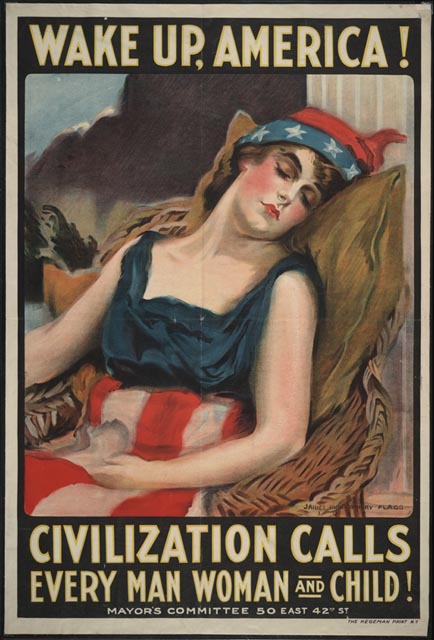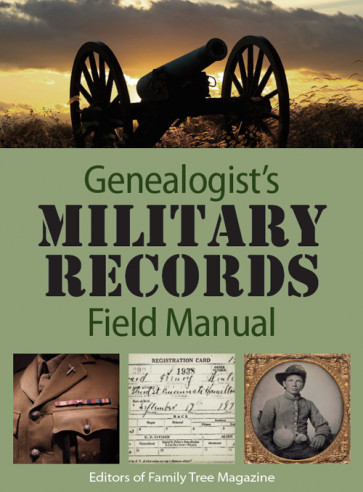Blog

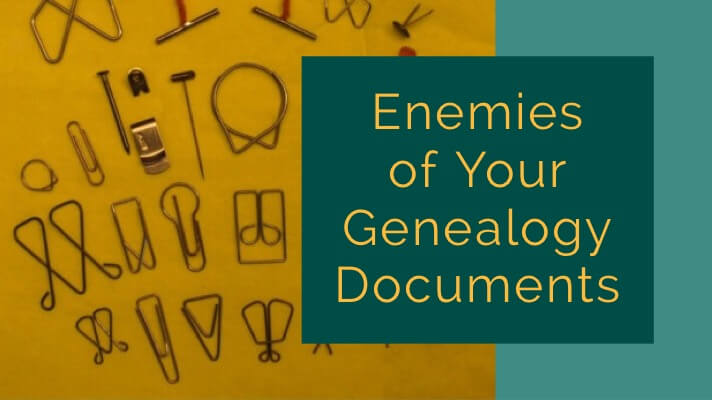
Enemies of Your Genealogy Documents: Metal Fasteners, Paper Clips, and Tape
Genealogists, like archivists, encounter staples, metal paper clips, rubber bands, tape and other fasteners attached to records. These were used frequently to keep documents together back in the day. Knowing what these items can do to genealogical records and how to remove them is a skill that every genealogist should have. The Archive Lady Melissa Barker shares her advice on what to do with these materials when you encounter them in genealogical documents.
You’ve probably encountered various forms of metal fasteners while combing through genealogical records. It is common to clip several documents together that belong together. Unfortunately, this practice continues today in record offices all across the globe. While it may be practical at the time for ensuring important documents stay together, it can actually be problematic when it comes to document preservation. Let’s take a look at the various types of fasteners and what you can do to ensure the survival of your precious documents.
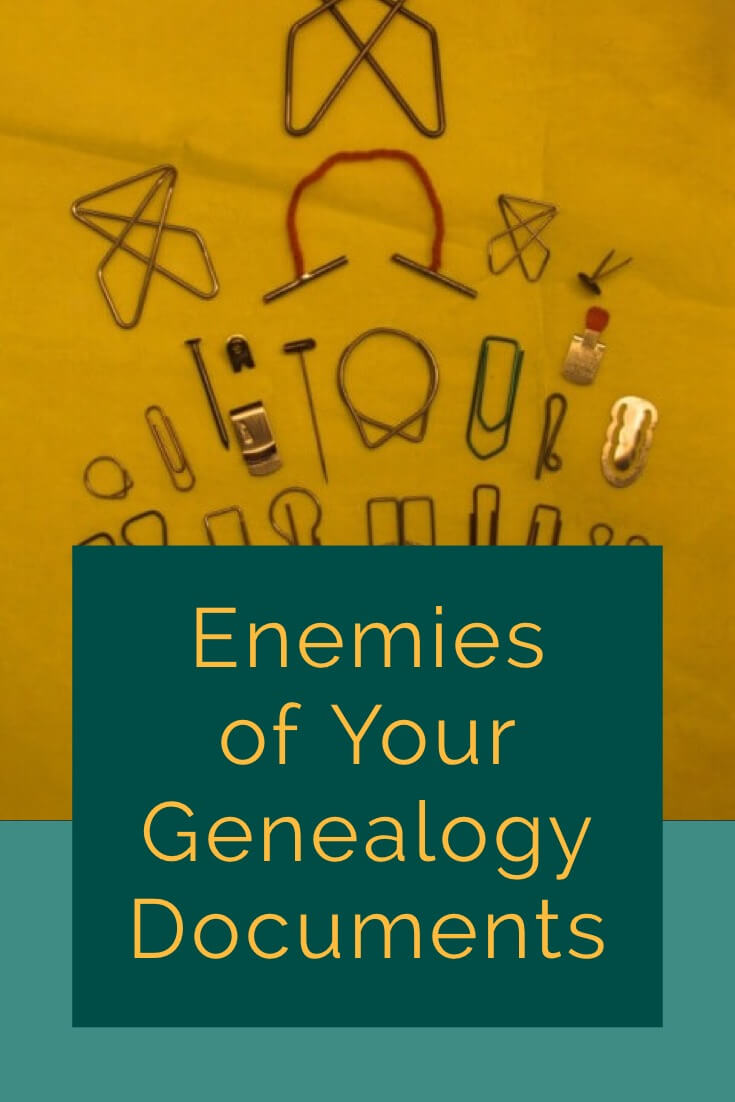
Metal Fasteners
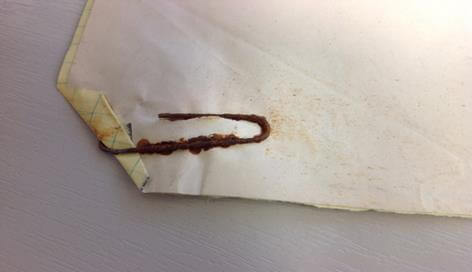
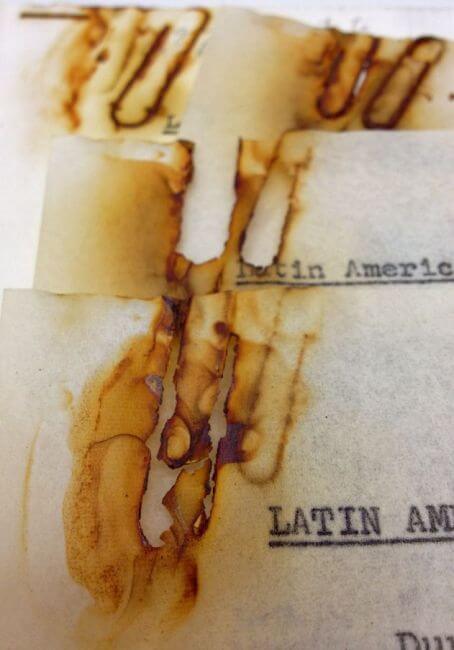
Genealogists ask me all the time why they should remove all metal fasteners from their genealogical records. Many believe these metal fasteners are part of the historical nature of the documents and should be left alone. Unfortunately, metal fasteners are a danger to genealogical records. The damage they can do to your documents can be extensive.
Over time, some metal fasteners can actually cause genealogical records to tear or become damaged. If the clipped-together documents are read over and over and the pages are flipped multiple times, the metal fasteners could cause ripping, tearing, and other damage to the document.
Sometimes metal fasteners get exposed to moisture and that causes the metal to become rusted and actually adhere to the document. Metal fasteners that stick or attach themselves to genealogical records will cause damage. To prevent this damage, I strongly recommend that you carefully remove all metal fasteners from all documents.
Rubber Bands
Rubber bands will deteriorate over time. The rubber breaks down in the presence of temperature and humidity fluctuations. Rubber bands will either become sticky or brittle over time. They will also leave a brown stain on your documents.
Removing rubber bands can be a difficult task if they have adhered themselves to the records. The most important thing to remember is to be patient when trying to remove rubber bands.
Cellophane Tape
In 1925, Richard Gurley Drew invented cellophane tape while working for Johnson & Johnson. This type of tape was often used on documents to mend tears and sometimes to attach pages together. As practical a solution as it may seem, cellophane tape or transparent tape should not be used on genealogical documents either.
Using cellophane tape is very destructive to documents and photographs. Tape breaks down over time and, like rubber bands, are susceptible to temperature and humidity. Tape will break down and become very sticky or it will become brittle. Either way, tape can cause damage to documents by sticking to the pages and leaving a yellow stain on the records.
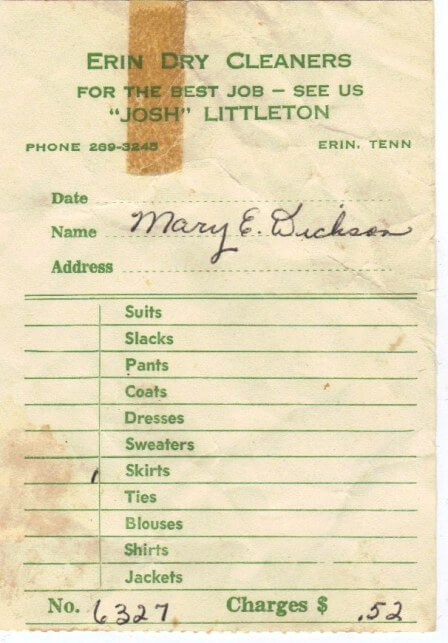
After Enemy Removal
Once you’ve removed the enemies of your documents, you’ll want to take additional steps to protect and preserve them. My quick and easy-to-read article of How to Archive Family History Documents will get you started.
If you do not feel comfortable removing metal fasteners, rubber bands or cellophane tape from your records, please consult with a professional conservator for help. You can find a professional conservator at the American Institute for Conservation of Historic and Artistic Works here.
Final Thoughts
It may seem like removing these fasteners from historical documents could be destructive, but in fact, the fasteners themselves cause destruction over time. Your best bet for the survival of these important records is to remove them. Taking steps to preserve the life of your most precious family documents is something we can all agree is a good thing!
Images courtesy Melissa Barker and the Houston County, TN Archives.
Listen to this segment on the Premium Podcast
Preserving documents and artifacts is a crucial part of genealogy for any family historian. The Archive Lady Melissa Barker is a regular contributor to the Genealogy Gems Premium Podcast to help you tackle these preservation challenges and answer your most pressing questions. Listen to this interview with Melissa Barker all about removing fasteners from documents in Premium Podcast Episode #161, available now to all Premium eLearning Members! Not a member? Sign up and start learning today!
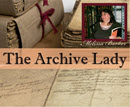
Melissa Barker
Melissa Barker is a Certified Archives Records Manager, the Houston County, Tennessee Archivist and author of the popular blog A Genealogist in the Archives and an advice columnist. She has been researching her own family history for the past 27 years.
(Additional content by Lisa Louise Cooke)
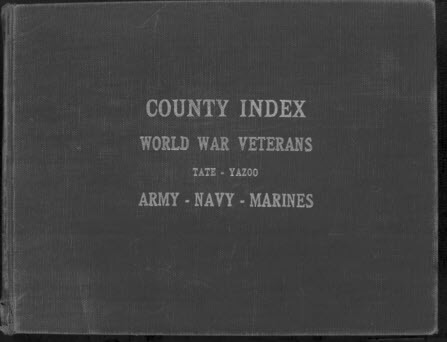
New Genealogy Records this week feature WWI Military Records
U.S. military records and more are making headlines this week for new genealogy records online. Explore WWI and military records for free at FamilySearch.org. Then head over to Fold3 to check out their updated WWII records. Various other U.S. collections are included, so take a look and discover your ancestors all across the U.S.
Featured: WWI & Military Records for U.S.
We are delighted by these new WWI and military records now available at FamilySearch.org. This genealogy giant records website is one of our favorites, and accessing their records is always free! In order to access the records, you’ll need to create a free FamilySearch account. Click here to read about why you should go ahead and create that free account – and use it!
- Alabama, World War I Service Cards, 1917-1919: “Index to a card roster of Alabamians who served in the United States Army, Navy, Coast Guard, or Marines during World War I from 1917 to 1919. Each soldier has one or two cards giving information on his/her military service, such as name, serial number, residence, place and date of birth, and more.”
- Georgia, Reconstruction Registration Oath Books, 1867-1868: “Registers typically contain each voters name, county of residence, date of registration, race, and an oath of allegiance to the United States. The oath of allegiance was required in order to register. Registered voters would then elect delegates to the state’s constitutional convention.”
- Indiana, World War I, Enrollment Cards, 1919: “Index to a card roster of Indianans who served in the United States Army, Navy, Coast Guard, or Marines during World War I. Each soldier has one or two cards giving information on his/her military service, such as name, serial number, residence, place, and date of birth, and more.”
 Mississippi, World War I Army Veterans, Master alphabetical index, 1917-1918: “Index and images of original typescript located at the State Archives in Jackson, Mississippi of ex-servicemen of Mississippi. The index lists name of veteran, race, serial no., address, and county.”
Mississippi, World War I Army Veterans, Master alphabetical index, 1917-1918: “Index and images of original typescript located at the State Archives in Jackson, Mississippi of ex-servicemen of Mississippi. The index lists name of veteran, race, serial no., address, and county.”- Veterans Administration Master Index, 1917-1940: This updated collection contains “an index to veterans who served at any time during World War I and who made (or whose heirs made) pension or benefits claims of the Veterans Administration between 1917 and 1940. Each card contains the name of the veteran as well as other personal identifying information such as home address at the time of enlistment, date of birth, and date of death.”
- Washington, World War I Veteran’s Compensation Fund Application Records, 1921-1925: Department of Veterans Affairs bonus records. They may contain the soldier’s name and rank, company, discharge date, occupation, date and place of birth, nearest relatives, and more.
WWII Records Updated at Fold3
More U.S. military records are available in Fold3’s newly updated WWII Draft Registration Cards collection. The collection now contains cards from Montana, Kansas, Pennsylvania, and Oregon. The cards in this collection are registration cards for the draft and do not necessarily indicate that the individual served in the military.
From the update description: “Information on the WWII Draft Registration Cards may include the man’s name, address, telephone number, age, place of birth, country of citizenship, name and address of the person who will always know the registrant’s address, employer’s name, place of employment, and a physical description of the registrant.”
Click here to browse the WWII Draft Registration Cards at Fold3.
More U.S. Records Now Online
Additional new collections for U.S. records are now online at MyHeritage.com. First is the U.S. Naturalization Records, Northern California, 1852-1989. This collection of over half a million records features an index of naturalization records in Northern California district and circuit courts for the years 1852 to 1989. In records prior to 1906, a limited amount of information is available, often only the name of the petitioner, the name of the court, record number, the petitioner’s country of origin, and the date of naturalization. After 1906, you may see additional information such as the petitioner’s address, names and addresses of any witnesses, birth date, as well as date and place of arrival in the United States.
MyHeritage’s new collection of Massachusetts Newspapers, 1704-1974 contains a whopping 6 million pages in 239 titles from various cities and towns in throughout the state. You’ll see a particular emphasis on papers from Boston and surrounding locales. Produced by MyHeritage in partnership with the Boston Public Library, this extensive collection includes papers from the colonial era through the late 20th century.
More to learn military records
If you’ve got military ancestors, you’ll want a copy of The Genealogist’s Military Records Field Manual from the editors of Family Tree Magazine. This book guide will show you how to research military ancestors using records from the Civil War, World War I, the Vietnam War and other significant conflicts throughout US history. Inside, you’ll find tips for using genealogy websites to find and use draft registration records, service records and more. Click here to order yours today.

Lacey Cooke
Lacey has been working with Genealogy Gems since the company’s inception in 2007. Now, as the full-time manager of Genealogy Gems, she creates the free weekly newsletter, writes blogs, coordinates live events, and collaborates on new product development. No stranger to working with dead people, Lacey holds a degree in Forensic Anthropology, and is passionate about criminal justice and investigative techniques. She is the proud dog mom of Renly the corgi.
Disclosure: This article contains affiliate links and Genealogy Gems will be compensated if you make a purchase after clicking on these links (at no additional cost to you). Thank you for supporting Genealogy Gems!
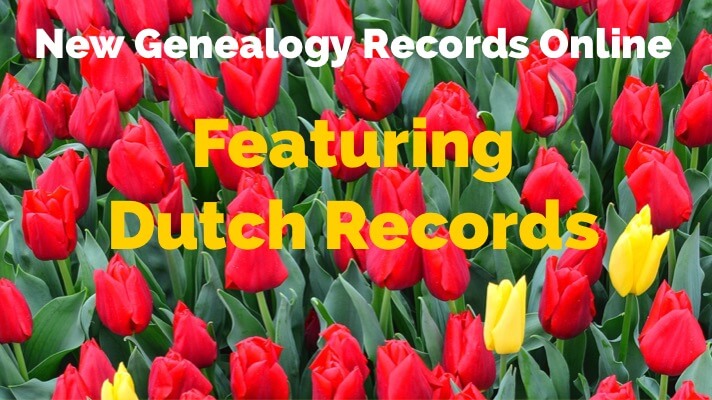
Discover Your Dutch Ancestors & More in New Online Genealogy Records
Featured this week is a fantastic resource for anyone searching for Dutch ancestors! Open Archives recently celebrated reaching 200 million historical person entries and collaborates with dozens of libraries and genealogical societies to make them all available online in one place. Also featured this week is the Ireland 1911 Census, online access to the New York Death Index, and major new additions to records for Hampshire, England.
Featured: Dutch Records at OpenArchives
Recently, we received an email from a Genealogy Gems Podcast listener about a huge milestone achieved by the Open Archives website. This free site is home to the largest collection of references to persons in Dutch historical records, and they just reached 200 million historical person entries! If you are researching your ancestors in the Netherlands, this is a one-stop-shop to access the records you need, since Open Archives currently offers data from 86 organizations.
From the press release: “…dive into records of the civil registry, baptism, marriage and burial registers, notarial deeds, militia registers and personnel administrations. Prayer cards, family messages and funeral cards are also very useful for genealogical research. Archive institutions and also local history and genealogical societies manage these sources, which are increasingly being made available in digital form. Open Archives has made the person entries in these sources searchable in one place.”
Ireland 1911 Census
Following the recent addition of the 1901 Census, FamilySearch has now made available the Ireland 1911 Census. This new collection is comprised of over 4 million indexed records. Search for your Irish ancestors and this collection might reveal their name, age, occupation, relationship to the head of household, marital status, education/literacy, religion, birth country, and other information. The index is free on FamilySearch and was created by the National Archives of Ireland.
New York Death Index
At MyHeritage, you can now browse 4.7 million records in the New York State Death Index, 1880-1956. You’ll find information on place and date of death, gender, age at death and the State file number. The images in this collection have been obtained through the outstanding work and efforts of Reclaim the Records. Due to the poor original documents these images are low-quality. For deaths referenced in this index copies of original death certificates can be obtained from the New York State Department of Health for a fee.
Hampshire, England Records
British genealogy giant Findmypast has over 2 million new records now available to search online, with the majority relating to Portsmouth in Hampshire, England. These unique collections come from a wide variety of resources beyond standard vital records and could shed valuable light on your ancestors’ lives.
- Hampshire, Portsmouth, Portsea Island Rate Books: Over a million pages of poor rate books from as early as 1700 through to 1921. The books recorded the amount of rates paid at each property, ownership of the property, and its location in the parishes of Portsea and Portsmouth. With each record, you will find a transcript of the vital facts and an image of the original rate poor.
- Hampshire, Portsmouth Hospital Records: Assorted hospital records and medical journals from St James Hospital between 1878 and 1918. At that time, the hospital was known as the Portsmouth Lunatic Asylum. Includes civil registers, deaths, indexes to admissions and discharges, maintenance ledgers, patient notes, registers of discharge and transfers.
- Hampshire, Portsmouth Police Staff Records, 1908-1924: The Portsmouth Police Service was formed in January 1836 and the city had its own police force until 1967. The city’s fire brigade was also a branch of the police force when it was first formed. Review this collection for years of service, birthplace, physical descriptions, photograph portraits, and more.
- Hampshire, Portsmouth Quarter Sessions Browse: Thousands of criminal records from court Quarter Sessions. The browse search allows you to search each Session register from beginning to end. As well as the accused’s age, aliases and home parish, the records will provide you with a wide variety of details relating to their offense, trail and sentencing.
- Hampshire, Portsmouth Burials: Over 129,000 additional Portsmouth parish records. The new additions cover Portsea, Highland Road and Kingston cemeteries between the years 1831 and 1902. Transcripts will reveal a combination of the deceased’s birth year, death year, age at death, burial date, burial location, denomination, occupation, residence and relatives names.
Discover your British and Irish ancestors at Findmypast
Findmypast ranks as one of the Genealogy Giants: one of the world’s biggest and best genealogy websites. It’s a must-use site for tracing your roots in England, Scotland, Ireland and Wales. Findmypast also offers unique resources for finding your family history in the United States, Canada, and Australia. And their expansive archive of newspapers, Catholic Heritage Archive, and access to the Periodical Source Index mean that Findmypast is well worth a visit. Explore now with a free 14-day trial!

Lacey Cooke
Lacey has been working with Genealogy Gems since the company’s inception in 2007. Now, as the full-time manager of Genealogy Gems, she creates the free weekly newsletter, writes blogs, coordinates live events, and collaborates on new product development. No stranger to working with dead people, Lacey holds a degree in Forensic Anthropology, and is passionate about criminal justice and investigative techniques. She is the proud dog mom of Renly the corgi.
Disclosure: This article contains affiliate links and Genealogy Gems will be compensated if you make a purchase after clicking on these links (at no additional cost to you). Thank you for supporting Genealogy Gems!


